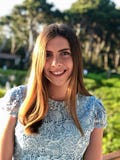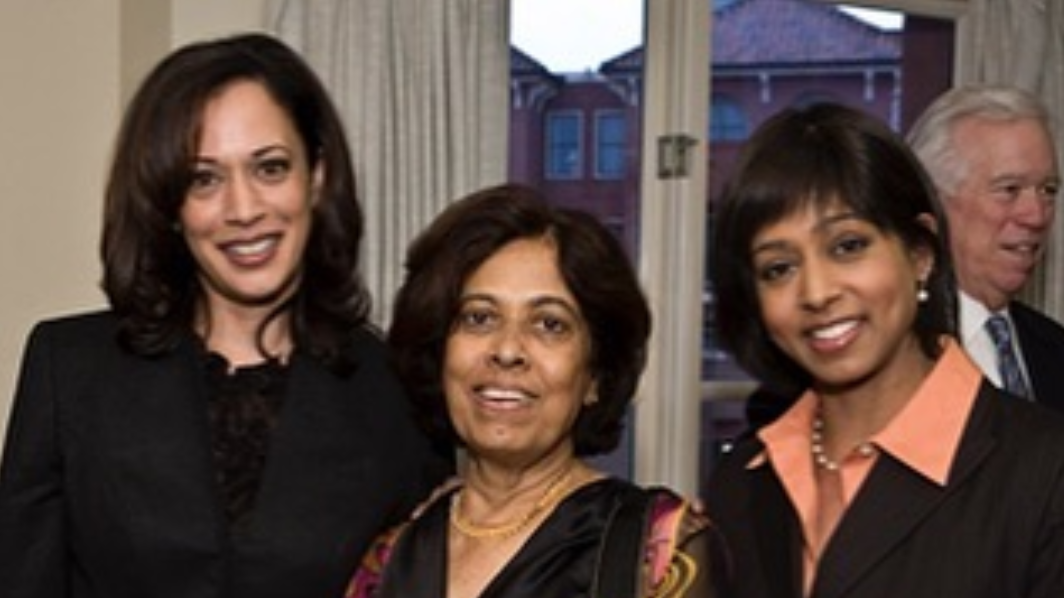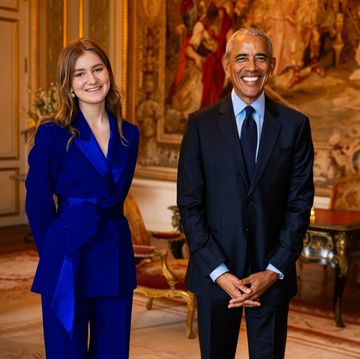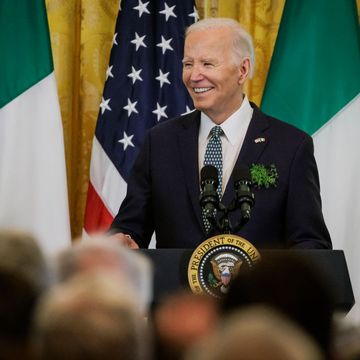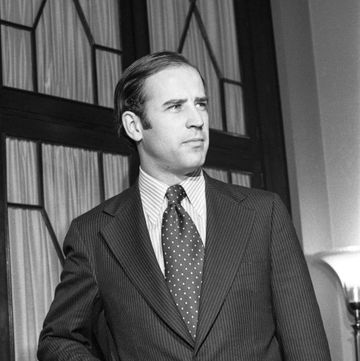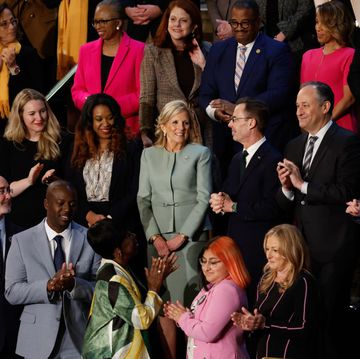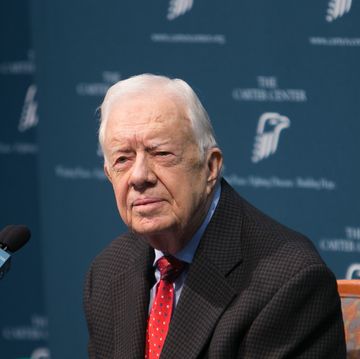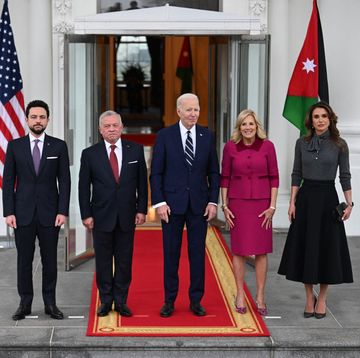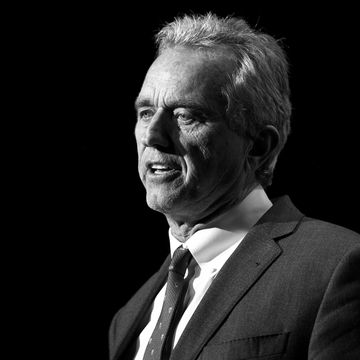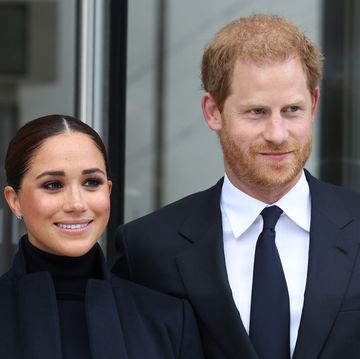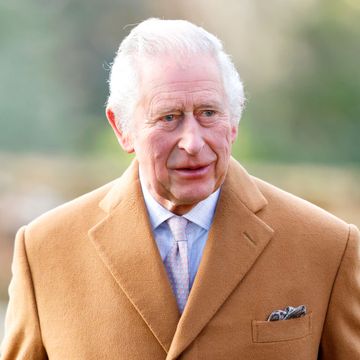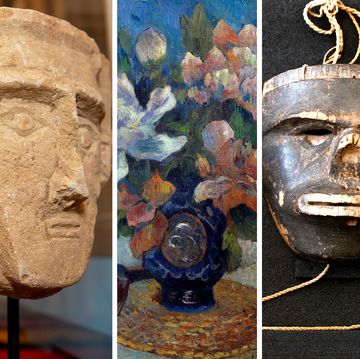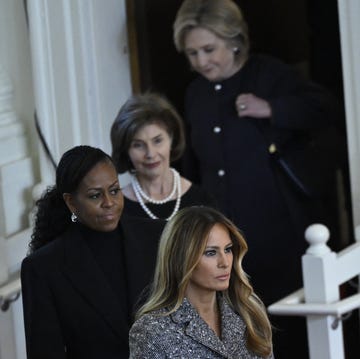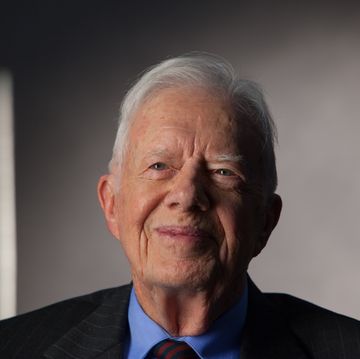Today, Vice President-elect Kamala Harris will be sworn in as the first first woman, first Black American, and first Indian American to serve just a heartbeat away from the nation's highest office. And at the inauguration ceremony, she'll be thinking about the significance of that—and what her mother told her about being a "first."
Speaking about the swearing-in ceremony on Good Morning America, Harris previously explained, "I was raised by a mother who said that to me all the time: 'Kamala, well, you may be the first to do many things—make sure you're not the last.' And that's how I feel about this moment."
In her work as a prosecutor, Senator, and on the campaign trail, Harris often discussed how paramount this familial background is in shaping her beliefs—and specifically, Harris has credited much of her success to her mother, who passed away in 2009. The Senator once called Shyamala Gopalan Harris, "the reason for everything."
Maya Harris, Kamala's sister, once tweeted, “You can’t know who Kamala Harris is without knowing who our mother was.”
Here's what we know about Harris's mother, a gifted scientific researcher and activist.
Shyamala Gopalan Harris immigrated to the United States from India.
Born in Madras (now Chennai), India, Gopalan was just 19 years old when she left India alone. Having graduated from Delhi University, she went to study at the University of California, Berkeley, where she received her doctorate in nutrition and endocrinology.
It was 1958 when Gopalan entered the U.S. and, at the time, most Indian households didn’t have phones. The only way for a young Gopalan to stay in touch with her family was through handwritten letters, known as aerograms, which often took about two weeks to arrive. But despite the distance, the family remained close.
She was a world-renowned scientist.
After receiving her PhD, Gopalan stayed at UC Berkeley and became a breast cancer researcher. Her success in this field took her to universities around the world, where she continued conducting research and teaching. She worked at the University of Illinois and the University of Wisconsin, spent time in France and Italy, and then received tenure at McGill University in Montreal. Gopalan brought her two daughters with her to Canada. Kamala lived there from age 12 until high school graduation.
Gopalan's breast cancer research was notably influential. Her work "sparked many advances regarding the role of progesterone and its cellular receptor in breast biology and cancer," said Breast Cancer Action's obituary. "The world of women affected by breast cancer changed for the better because of [Gopalan's] presence in it."
Gopalan was a civil rights activist and met her husband at a protest.
In the 1960s, Gopalan met the man who would become her husband and the father of her children: Donald J. Harris. Both were immigrants (Harris from Jamaica) getting doctorates at UC Berkeley and were actively involved in the civil rights movement; they met at a protest. The pair married in 1963 and remained involved in the movement, even bringing their daughters along from time to time.
“That’s how they met—as students, in the streets of Oakland, marching and shouting for this thing called justice, in a struggle that continues to this day,” Harris said in her first public remarks as Biden’s running mate. “And I was part of it. My parents would bring me to protests—strapped tightly in my stroller.”
Gopalan and Harris eventually divorced in the early 1970s, when Kamala was 7, but Gopalan continued fighting for racial equality. She mentored students of color, counseled African-American women battling breast cancer, and instilled political activism in her daughters.
"My mother had been raised in a household where political activism and civic leadership came naturally," Kamala Harris wrote in her 2019 autobiography, The Truths We Hold. "From both of my grandparents, my mother developed a keen political consciousness. She was conscious of history, conscious of struggle, conscious of inequities. She was born with a sense of justice imprinted on her soul."
Harris recently told Vogue that her experiences of "being in a stroller" surrounded by activists informed her view of the ongoing fight against structural racism. "The Black Lives Matter movement, this movement that we are witnessing and had witnessed through the summer, is an extension of that movement," she said of the civil rights movement.
She mentored countless students.
According to her obituary, Gopalan spent much of her time as a scientist teaching and helping students in her lab. Many of these students had backgrounds similar to her own.
"Often of color and the first in their families to pursue careers in science, these students eagerly sought Shyamala's mentorship, which often stretched beyond the lab to encompass lessons in life," the obituary said. "Whether helping a student negotiate the UC bureaucracy, find an affordable apartment, or enjoy a home cooked meal, Shyamala was there."
Gopalan was also known for her work ethic and dedication to her students. According to the Los Angeles Times, after she had back surgery, Gopalan worked from an adjustable mattress in her Oakland apartment, a sea of papers spread around her.
Kamala and her mother were very close.
After Gopalan's divorce, she raised Kamala and Maya mostly as a single mother. Because of this arrangement, Kamala and her mother developed an incredibly close relationship, one that Kamala still views as incredibly formative.
In her speech at the 2020 Democratic National Convention, Senator Harris extensively discussed the impact her mother made on her life. She noted how Gopalan's grit and strong moral code shaped her both as a person and a politician.
"Even as she taught us to keep our family at the center of our world, she also pushed us to see a world beyond ourselves," Harris said of her mother. "She taught us to be conscious and compassionate about the struggles of all people. To believe public service is a noble cause and the fight for justice is a shared responsibility."
While Harris clearly misses her mother, who passed away in 2009 from colon cancer, she places great value on continuing her legacy.
"My mother taught me that service to others gives life purpose and meaning. And oh, how I wish she were here tonight but I know she's looking down on me from above. I keep thinking about that 25-year-old Indian woman—all of five feet tall—who gave birth to me at Kaiser Hospital in Oakland, California," Harris said. "On that day, she probably could have never imagined that I would be standing before you now speaking these words: I accept your nomination for Vice President of the United States of America."
Harris continues to honor her mother's legacy.
Gopalan passed away at age 70, but eleven years later, both of her daughters make clear that their mother's influence is constantly present in their lives.
In a 2018 New York Times op-ed, Senator Harris wrote about her mother's battle with cancer in the context of healthcare accessibility and in inspiring her political career.
"And though I miss her every day, I carry her with me wherever I go. I think of the battles she fought, the values she taught me, her commitment to improve health care for us all," Harris wrote. "There is no title or honor on earth I’ll treasure more than to say I am Shyamala Gopalan Harris’s daughter. As I continue the battle for a better health care system, I do so in her name."
Harris continues to speak about her mother often, whether through social media, political ads, or public addresses. Gopalan clearly made a major impact on her daughters' lives, and continues to do so.
"She was the kind of parent who if you came home complaining about something, she’d say 'Well what are you gonna do about it?'" Kamala wrote in a 2019 Instagram post. "So I decided to run for President of the United States."
On the night she and Biden were declared the winners of the 2020 election, Harris's mother was on her mind. "I thought about what her life meant" and how it enabled Harris to get to that point, she told Vogue.
Harris will think about her mother at the inauguration ceremony.
Today, Harris will be sworn into office as the Vice President of the United States. Last year, during an appearance on Good Morning America following the November election, interviewer Robin Roberts asked Harris what will be going through her mind as she makes history that day.
"I'll be thinking about my mother," Harris replied. "But I feel a very big sense of responsibility, as I said recently, that I will be the first, but I will not be the last. I was raised by a mother who said that to me all the time: 'Kamala, well, you may be the first to do many things—make sure you're not the last.' And that's how I feel about this moment."
